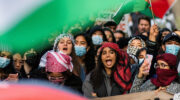The Explainer
Rules of war: What are they? Will they matter in Israel-Gaza conflict?
| View caption Hide caption
More than 1,000 miles to the north, it’s clear that some Russian units invading Ukraine made a practice of summarily executing and raping civilians, and that officials in Moscow – allegedly including President Vladimir Putin – masterminded the deportation of Ukrainian toddlers to Russia.
To state the obvious, it’s clear that the mere existence of the Geneva Conventions and other such widely signed statutes is no guarantee of their success. Yet analysts say these agreements do still have an influence, helping to save civilian lives in practice, affecting how wars are waged, and, importantly, often resulting in legal action to hold violators to account after infractions occur.
In Gaza, applying rules of war is complicated, too, by the somewhat murky status of the conflict. Hamas is not a national army, but Hamas has in effect been governing Gaza and has a large fighting force. To many analysts, the conflict represents a “non-international armed conflict,” such as when a nation’s military engages a nonstate armed group during a civil war. Many of the rules of war would still apply, however, such as key provisions to protect civilians.
View caption Hide caption
What exactly are the Geneva Conventions?
The First Geneva Convention, adopted in 1864, became a pillar of the law of war with the novel, humane idea that wounded people, and those helping them, should be protected. This also marked the formation of the Red Cross, its symbol – the reverse of the Swiss flag – being a nod to its birth country.
The concept of war crimes continued to develop around the dawn of the 20th century, despite some Western diplomats who argued that to talk of “humanizing” combat was “nonsense.” The Hague Conventions of 1899 banned asphyxiating gases, balloons that delivered explosives, and bullets that expand in the body – the latter over the objections of the British, who at the time were using them against agitating subjects in their colonies.
The Geneva Conventions (now plural) of 1949 widened the protection of noncombatants and have been adopted by every nation in the world. Further expanded with the 1977 protocols, they ban, among other things, murder, torture, and brutality against civilians, and require the free passage of food and medical supplies for them. They also prohibit the taking of hostages.
Grave violations of the Geneva Conventions can be – and have been – prosecuted in individual countries as well as through the International Criminal Court at The Hague, Netherlands.
View caption Hide caption
Groups like Hamas often use civilians as shields. Does this affect the rules?
Gaza is a densely populated area, and Hamas certainly takes advantage of that. Legitimate military targets exist in Gaza, and Hamas fighters – who have committed atrocities that investigators are already documenting for war crimes prosecutions – aren’t entitled to civilian protections.
“I think it’s important to underline that,” says Tom Porteous, deputy program director at Human Rights Watch. But he says governments must always abide by a golden rule of international humanitarian law: “Atrocities committed by one side do not justify ignoring the laws of war on the other side.”
Israel has warned some 1 million Palestinians to evacuate northern Gaza in advance of expected ground operations. Hamas has called on people to stay in their homes.
The Israeli government’s warnings are precautions that attackers are required to take to minimize civilian harm. That said, Palestinians who choose not to leave their homes “would not thereby lose their civilian protections, including their protection from indiscriminate attacks or starvation as a method of warfare,” notes Tom Dannenbaum, a legal scholar at the Fletcher School of Law and Diplomacy.
Israeli Defense Minister Yoav Gallant announced precisely this method of warfare last week in laying out plans for a siege to block electricity, food, and fuel into Gaza. “We are fighting human animals,” Mr. Gallant said of Hamas, adding that Israel will “act accordingly.”
Such an order, which could clearly result in the starvation of civilians, constitutes a “massive war crime,” says Mr. Dannenbaum. It is also collective punishment, which is likewise against the law.
View caption Hide caption
What can the U.S. do to reinforce international human rights law?
In the wake of the Hamas attacks, the United States has been sending strong signals of support for Israel’s right to respond. At the same time, the Biden administration has pushed for minimizing civilian casualties. Additionally, Secretary of State Antony Blinken sought to address concerns this week by calling for a release of hostages by Hamas and for Israel to agree to allow humanitarian aid for civilians in Gaza from donor nations and multilateral organizations.
As a general rule, money is one method by which the U.S. can seek to reinforce international humanitarian law. The U.S. Foreign Assistance Act makes it clear that countries engaging “in a consistent pattern of gross violations of internationally recognized human rights” risk having U.S.-provided security assistance revoked.
“Gross violations” of human rights is a term that has precise legal meaning, and includes torture, prolonged detention without trial, and forced disappearances. The U.S. government “appears to have rarely restricted assistance pursuant to this provision,” a March Congressional Research Report notes.
There are other monitoring tools Washington has at its disposal. The Leahy Law, named after former Sen. Patrick Leahy, who championed it in 1997, prohibits U.S. security assistance from going to any unit of a foreign security force when there is credible information that the unit has committed a gross violation of human rights.
Last December, a significant amendment came into effect to close a “persistent loophole” in the law’s implementation – the fact that it has been difficult for the U.S. to trace where its money is going, according to the Center for Civilians in Conflict.
And in August, the U.S. put into effect the first formal system for tracking any nefarious use of U.S. weapons provided to foreign governments. Through the new Civilian Harm Incident Response Guidance, U.S. officials will investigate allegations of human rights violations and potentially cut off the spigot of U.S. weapons to offenders.
“It’s not only the right thing to do from a moral perspective,” a senior State Department official told The Washington Post. “It is more effective for U.S. national security if our partners are using these weapons responsibly.”
Many experts say an important step America could take to bolster international human rights law would be to join the International Criminal Court (ICC), as the court that enforces that law.
Are there examples of progress?
Yes, especially on the justice front. Last year a court in Germany sentenced a former Syrian intelligence official to life in prison for crimes against humanity, and a French court convicted a Liberian fighter for direct involvement in torture 25 years earlier, Mr. Porteous notes.
View caption Hide caption
A decade ago, the conviction of the former president of Liberia for war crimes in Sierra Leone “sent a strong deterrent signal, at least in West Africa, at the time,” he adds.
Justice is hard-fought, Mr. Porteous acknowledges, but human rights law does reward determination.
In March, the meticulous documentation of Mr. Putin’s role in the deportation of Ukrainian children led to the ICC issuing an arrest warrant for him.
Though Russia – like the U.S. and Israel – is not a member of the ICC, signatories to the Rome Statute are required to arrest wanted persons who travel to their country.
Mr. Putin didn’t travel to an August summit in South Africa, an ICC member, because he could have been arrested there, Mr. Dannenbaum says. “That’s a significant impact.”
It might not happen quickly, but crimes against humanity “have no statute of limitations,” he adds. An arrest warrant from the ICC, in other words, “will hang over individuals for the rest of their lives.”




